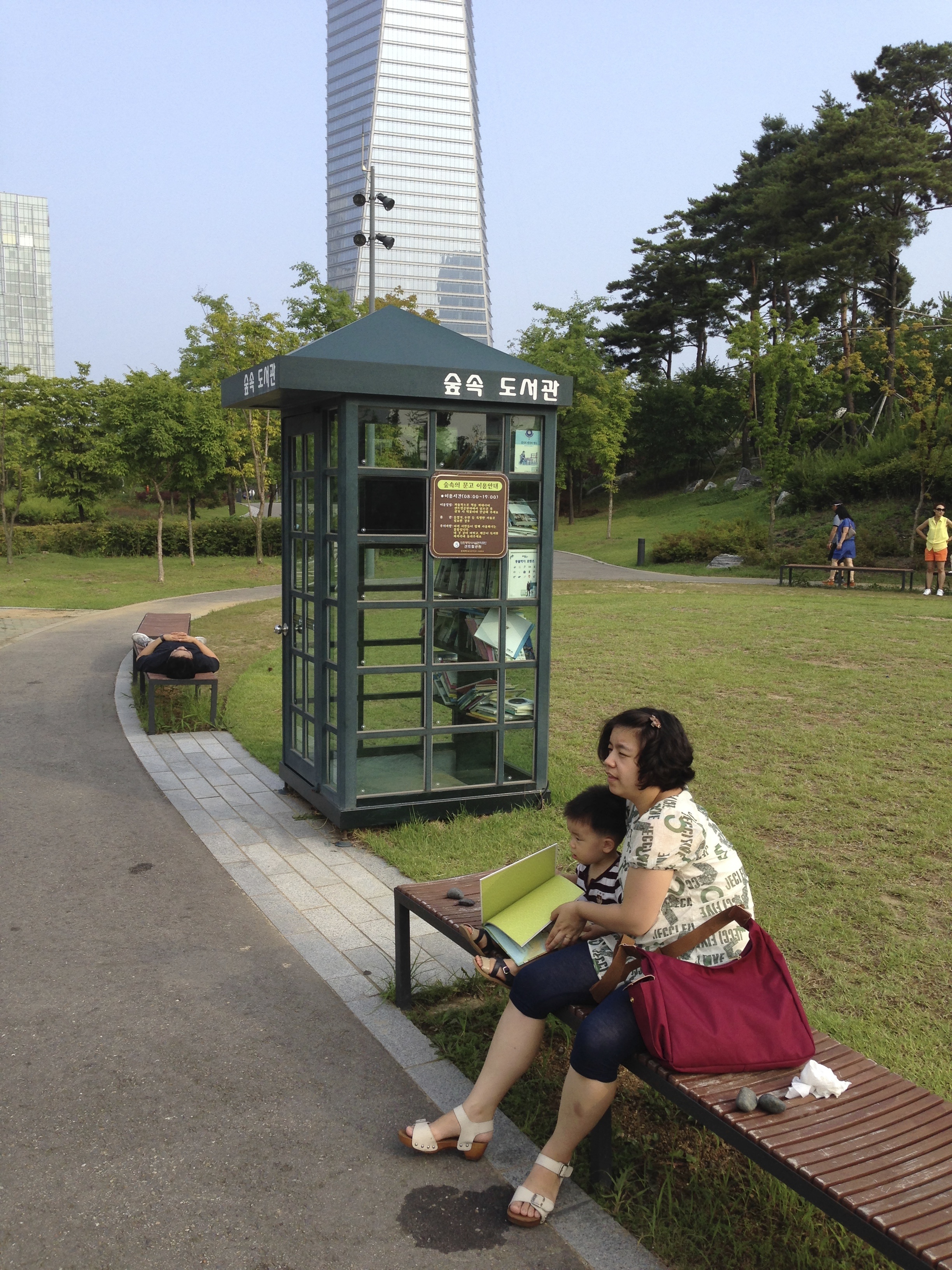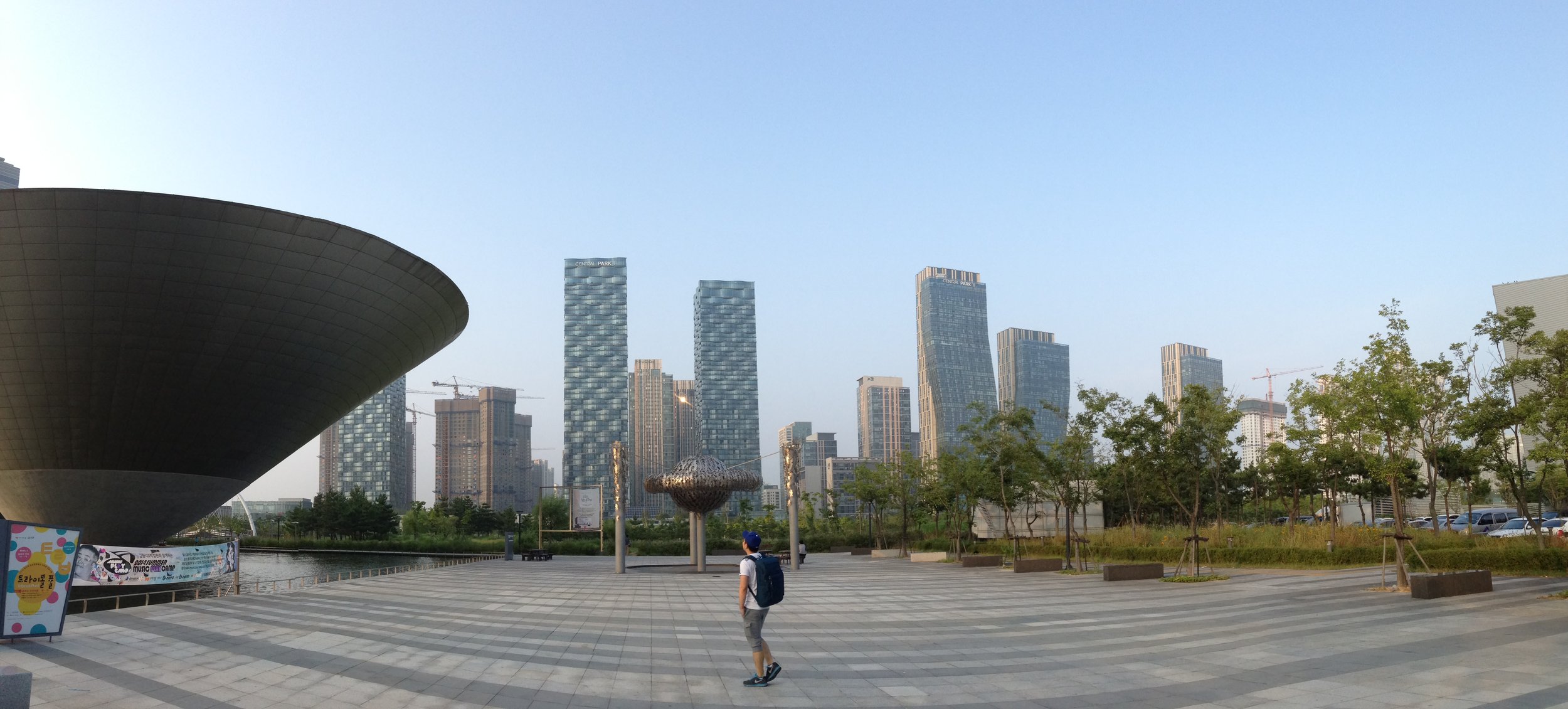Exploring Korea's "Smart City"
 After living in China, I thought I had become inured to the massive scale of urban development, glossy investment ads promoting developing zones and other schemes, and the general fever for anything modern, glassy, and futuristic. But Korea is home to an urban development scheme that outdoes even China in ambition and scope: the Songdo Smart City.
After living in China, I thought I had become inured to the massive scale of urban development, glossy investment ads promoting developing zones and other schemes, and the general fever for anything modern, glassy, and futuristic. But Korea is home to an urban development scheme that outdoes even China in ambition and scope: the Songdo Smart City.
Costing around $40 billion, Songdo will hold 65,000 residents and 300,000 workers by 2015, according to the BBC. Not long ago, this was ocean: all of the city is built on land reclaimed from the Yellow Sea, just as Incheon airport was.
I visited the city, lying at the southern end of Seoul's neighbor port city Incheon, a few days go to see for myself. While it is very much a work in progress, the city is not empty. Thousands of residents have moved in, a Sheraton hotel is open, and work recently finished on South Korea's tallest building, the Northeast Asia Trade Center. Yet, Songdo still leaves much to be desired. Whether its "smart" depends on your definition of what a smart city is, and what kind of city you'd want to live in.
International City?
I exited the Central Park Subway station and began my exploration at the "Compact Smart City" exhibit, a planning exhibition hall showcasing the history of Incheon, the plans behind Songdo, as well as scale models of Incheon. I was surprised to learn that Songdo is actually one of many development zones planned for this coastal city. Incheon, already Korea's 3rd largest city, is planning several new areas around its harbor and international airport, which is the main gateway to Korea and one of the best airports in the world. It is a true "airport city," as described in the book Aerotropolis: a city structured around its transport connections to the rest of the world. Whereas airports were once sited on the periphery of cities, they are now becoming central to them.
Songdo is very much a part of this effort to make Incheon into a hub of "northeast Asia". Lying between Japan and China, with quick access to the world's most dynamic region, the city is designed to be international in every sense of the word: foreign schools for expats, branch campuses of major U.S. and Korean universities, abundant foreign food, future headquarters of regional agencies of the UN, and other multinational companies. As of yet there are few foreign residents, the only other Westerner I met on my stroll around the area was a flight attendant from British Airways staying at the Sheraton for his 2 day stay in Korea.
Nearby the central park area, which forms a spine in the area of Songdo currently open, is the commercial development, a linear pedestrian mall that stretches for several large city blocks. Filled with shops and restaurants, cafes, and other mall features that seemed to have been lifted straight from my native Southern California. But its quite clear that the most avid consumers of this type of lifestyle will be eager Korean middle class residents who are drawn by promises of a modern Western-style life. Expats in Seoul would probably not choose to be marooned over an hour away from Seoul in a sterile city of glass condos and cookie-cutter restaurants.
There are a few interesting features in the park: free mini-libraries for children, traditional wooden totems, and other elements that add a "local flair" to the otherwise generic environment.
Smart Design?
Songdo will have many advanced technical amenities: so-called ubiquitous internet connections that will allow residents to work or connect to the internet from anywhere (not that other areas of Seoul are especially lacking in that), a network of sensors and monitoring systems that provide information on the operation of the city's waste systems, traffic, and energy use. These behind-the scenes systems are what allows the planners to call Songdo a "smart city"--this is also the " value-added" by companies like Cisco Systems, which was a major investor and partner of the project, along with the American developer Gale International and Korea's Posco Engineering and Construction, one of the country's largest construction companies.
But outside of the intelligent system that a casual pedestrian wouldn't notice, what about the larger urban design of the site itself? Advertised as a smart, compact city, Songdo doesn't quite live up to that claim. There are subway connections to Incheon--although central Seoul is over an hour and a half by metro. However, the scale of the site and width of the empty streets makes walking less than convenient and certainly not pleasurable. The "central park" is the best feature of the site featuring a small lake, paths for strolling amidst lawns, Korean-style pavillions, and kayaks and boats for rental. Eventually there will be an even larger "cultural complex", designed in a traditional Korean style. It will be a hotel and commercial complex and is being developed by Shinsegae, the country's largest mall developer (see below).

Smart should mean allowing for change
At its core, Songdo is a legacy of modernist planning and architecture. It is more walkable and dense than Brasilia or American suburbia. It does strive to be ecologically sustainable in its smart systems and conveniences. But as a planned city attempting to regulate and control almost every aspect of the city's character (or lack of) and future inhabitants' lives, it has more in common with ideas from the 1950's that have been fairly discredited in the West.
As urbanist Richard Sennet points out, "smart cities" incorporating information technology to improve delivery of services for residents could be a good thing. But if a city is so overly "smart" that it doesn't allow for any change or future flexibility in land use, it won't ultimately deliver residents' needs for community or belonging. Yes, modern amenities are preferable to living in slums. But it isn't an all-or-nothing proposition. Must we have either pre-programmed smart cities or undeveloped backwardness of traditional cities? That is a false choice that some might have us believe. A truly smart city is a city that allows for users to modify their environment, for owners to change their buildings or open new shops without approval of a single developer who controls everything, a place that can adapt over time as economic trends shift and the needs of residents evolve. That is the danger for places like Songdo: that the scope of planning leaves little room for future modification. It remains to be seen whether, in a few decades or even years, Songdo remains a smart city, or if it will be known as yet another folly of modernist thinking on par with Brasilia, or countless other carefully planned utopias that ended in dystopia.
Further Reading
Official site: http://www.songdo.com
BBC: http://www.bbc.com/news/technology-23757738
http://www.bbc.com/news/technology-20957953
Cisco: http://newsroom.cisco.com/press-release-content?articleId=426592
Aerotropolis: the way we'll live next






